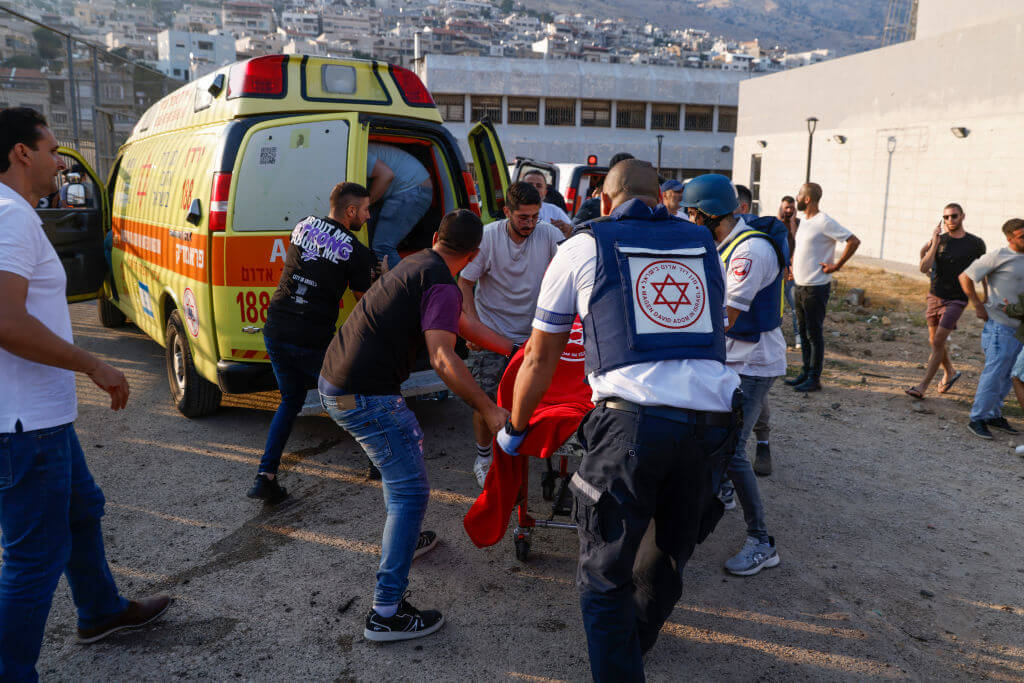Rocket from Lebanon kills 12 children and teens in Israel, raising prospects of broader war
Israeli Prime Minister Benjamin Netanyahu moved up his return from the United States, and Israeli officials promised a heavy response to the attack

Israeli security forces and medics transport casualties along with local residents, at a site where a reported strike from Lebanon fell in Majdal Shams village in the Israeli-annexed Golan area on July 27. Photo by JALAA MAREY/AFP via Getty Images
(JTA) — A rocket fired from Lebanon struck a soccer field in the Golan Heights, killing 12 people ages 20 and under, in the worst attack on civilians in Israel since Oct. 7.
The attack, which Israel has attributed to the Lebanese terror group Hezbollah, heightened the chances of a broader war on Israel’s northern border. Hezbollah has been firing missiles at Israel since the beginning of the Israel-Hamas war nearly 10 months ago, prompting a heavy Israeli response and the evacuation of tens of thousands of Israelis from border towns.
Israeli Prime Minister Benjamin Netanyahu moved up his return from the United States, and Israeli officials promised a heavy response to the attack.
“We are nearing a full war against Hezbollah and will respond to this incident accordingly,” Foreign Minister Israel Katz told Israeli media. “There will be costs to the front, and there will be costs to the home front, but we are at a turning point.”
The rocket fired on Saturday hit the Druze town of Majdal Shams, the center of the local Druze population, at the northern tip of the Golan Heights, near Israel’s borders with Lebanon and Syria. A warning siren sounded ahead of the incoming rocket, but without enough time for the children on the field to evacuate, according to reports in Israeli media.
“A dark day has fallen on Majdal Shams,” said Dolan Abu Saleh, the head of the Majdal Shams Council, according to the Israeli publication Ynet. He asked residents to stay off the roads to clear lanes for emergency personnel, adding, “We are still amid the incident, and another salvo is likely.”
Hezbollah denied responsibility for the attack, though it had earlier said it fired rockets at a nearby target. Israel said the rocket was Iranian-made and was used only by the terror group.
“According to the IDF’s reliable intelligence, the Hezbollah terror organization is behind this barrage,” the Israel Defense Forces spokesman, Rear Adm. Daniel Hagari, posted on X. “The incident this evening was the most severe strike on innocent civilians.”
Israel’s Druze community lives largely in northern Israel and the Golan Heights, and Druze citizens of Israel serve in the military. Israel captured the Golan Heights from Syria in 1967 and later annexed it, but because that claim is still disputed, some Druze in the Golan have not obtained Israeli citizenship. Hagari wrote on X, “We embrace the families of those killed and wounded, and the whole Druze community, citizens of the state of Israel.”
Hezbollah began attacking northern Israel shortly after Hamas’ Oct. 7 invasion devastated the country’s south and sparked the war in Gaza. Since then, dozens of Israeli and Lebanese civilians have been killed in the fighting on Israel’s northern border, in addition to 18 Israeli soldiers and hundreds of Hezbollah fighters in Lebanon and Syria.
Thus far, Israel and Hezbollah have stopped short of escalating to an all-out war, which they last fought in 2006. Hezbollah is thought to pose a greater threat to Israel than Hamas, with the ability to strike much of the country. In a June survey, Israelis were split over whether to end the conflict in the north through diplomacy or to enter a broader conflict against Hezbollah.
Now, some Israeli leaders are calling for an escalation.
“The one responsible for the murder of many children and youth in Majdal Shams is Nasrallah,” tweeted right-wing lawmaker Avigdor Liberman, referring to Hezbollah chief Hassan Nasrallah. “And the time has come for him to pay the price.”













